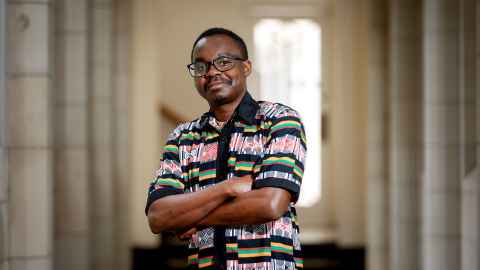Children’s rights a key passion for law student
04 September 2025
Mateo Chitha, PhD candidate and recipient of the Professor Brian Coote Memorial Scholarship, is advocating for a review and reform of intercountry adoption legal and policy frameworks in his homeland of Malawi.

As a first-year student enrolled in a Bachelor of Social Science at the University of Malawi, Mateo Chitha was certain he was on the right path. The thought of studying law hadn’t crossed his mind – until, as his second semester finished, he felt a sudden urge to apply for entry into the competitive Bachelor of Laws (Honours) programme.
“I remember sending my application in the very day they were closing,” he recalls. “Something was pushing me. I had to do it.”
After making the shortlist and passing his entrance exams, he began his LLB in 2012 and quickly fell in love with the law.
“The beauty of the law is that it covers pretty much everything. It gives you freedom in terms of what you want to do with what you have learned and room to exercise your personality and see how you can help other people.”
While initially interested in property law, Mateo’s first job following graduation in 2017 changed that. As a Legal Officer for the Child Case Review Board in Malawi, he was tasked with assisting the Board in monitoring the implementation of children’s rights in the small southeast African country.
The experience sparked a deep interest in children’s rights which led him to enrol in a Master of Laws in Advanced Studies in International Children's Rights at the Netherlands’ Leiden University Law School in 2021. There, he found his purpose.
“My masters cemented my area of interest. From that moment, I knew I wanted to do a PhD in an area within children’s rights.”
Following his masters degree, he returned to the Malawi Judiciary, which he had joined as a Senior Resident Magistrate in 2018. Outside of his work – he is also an Assistant Editor of the Malawi Law Reporting Unit – he began searching for potential PhD supervisors. It wasn’t long before he stumbled across an academic with a long history of research on children’s rights and family law: the University of Auckland’s Professor Mark Henaghan.
With Mark’s encouragement Mateo applied for a PhD at the University, gladly accepting the offer over other tertiary institutes despite feeling somewhat anxious about moving halfway around the world.
“For me it was an easy decision. Mark had already made me feel at home, even without me physically being in New Zealand.”
In July 2024 he travelled to Auckland to begin his PhD, bolstered by a Professor Brian Coote Memorial Scholarship, which Mark had recommended him for.
Established in 2021, the scholarship is funded by a significant bequest left to the Auckland Law School by the late Emeritus Professor Coote CBE, who taught there for 33 years and was both Acting Dean and Dean for a period in the 1980s. It recognises students like Mateo who share his passion for the law and its power to effect change.
His PhD is focused on the regulation of intercountry adoption in Malawi, an issue which was first drawn to his attention while working for the Child Case Review Board and highlighted further during his masters degree.
“When I was studying in the Netherlands, Malawi was being mentioned for all the wrong reasons – because of the Madonna adoption cases,” he says.
His comment refers to pop star Madonna’s adoption of four children from Malawi in 2008, 2009 and 2017. The cases caused widespread international debate, largely in response to a residency requirement legislative provision arguably being overlooked. This raised the question of the influence of aid: was the support Madonna poured into Malawi an influencing factor in the court’s decision to allow the adoptions?
Since the Madonna cases, concerns have been raised about the regulation of adoption in Malawi. As such, there have been calls for a thorough review and reform of the legislative framework. Offering his reflections on that, Mateo is reviewing the influence of sociocultural and socioeconomic factors on the legal and policy frameworks of intercountry adoption in Malawi, beyond the Madonna adoption cases.
“Sociocultural factors include how, in African countries like Malawi, children are regarded as an investment for the family. This means it's not an easy decision to allow an adoption,” he explains. “Socioeconomic factors include the economic background and issues of poverty, especially for a country like Malawi, which is one of the poorest countries in the world. How does this social context influence the decisions of stakeholders like the courts and guardians ad litem, who are the social welfare officers who assess child backgrounds?”
Mateo is using empirical research methods – something he says is uncommon in the legal field – to accurately understand the social context in Malawi. Supported by his co-supervisor Dr Katherine Doolin, an experienced empirical legal researcher, he will conduct first-hand interviews with stakeholders and analyse intercountry adoption court documentation.
Through his research, he hopes to influence law reform in line with recommendations made by the Malawi Law Commission after reviewing existing adoption laws. These include advocating for Malawi to become a contracting party to the Hague Convention on Protection of Children and Co-operation in Respect of Intercountry Adoption, an international treaty that safeguards children’s rights.
“I'm already thinking ahead,” he says. “What are some of the sociocultural and socioeconomic issues Malawi should consider in terms of implementing the Hague Convention if we become a contracting party?”
While only in his doctoral provisional year of study, Mateo intends to continue his work in the law following his PhD, whether through further research or a legal career. Either way, he knows one thing is clear: he will be using the law as an avenue through which he can help his communities.
Media contact
Helen Borne | Communications and Marketing Manager
Alumni Relations and Development
Email: h.borne@auckland.ac.nz